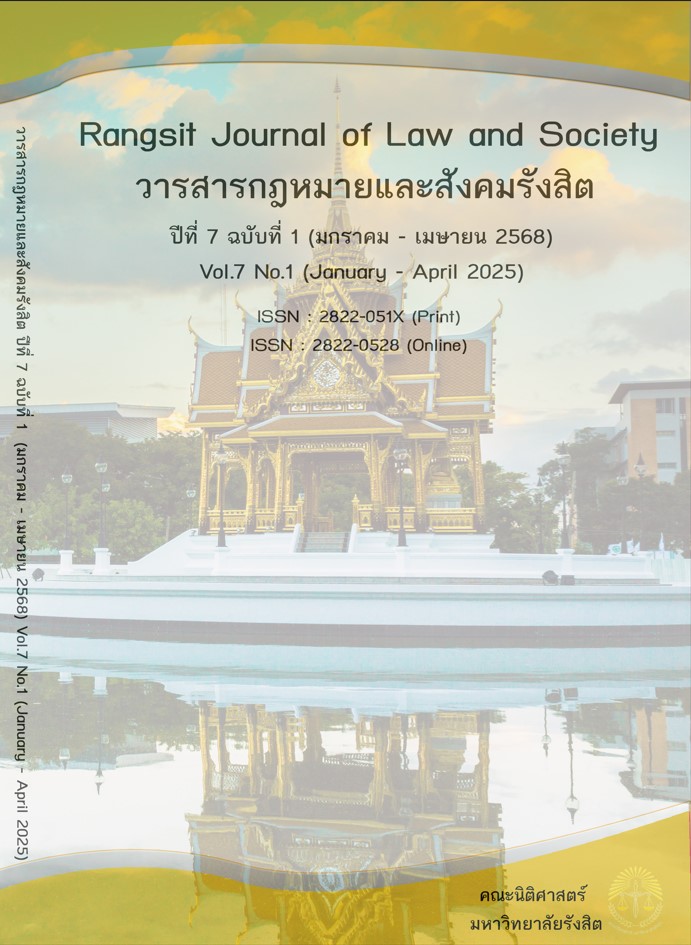ISSUES IN THE ENFORCEMENT OF PERSONAL DATA PROTECTION LAWS IN PUBLIC HOSPITALS
Main Article Content
Abstract
At present, technology plays a significant role in the collection of personal data and the operations of government agencies, state enterprises, and private organizations. This is particularly evident in public hospitals, which handle personal health data of service recipients, a category of data protected under Section 7 of the National Health Act B.E. 2550 (2007). Previously, the principles governing personal data protection were subject to Section 24 of the Official Information Act B.E. 2540 (1997). Until Thailand recognized the right to privacy in personal data — a right acknowledged under international human rights law, particularly the Universal Declaration of Human Rights (UDHR) and the International Covenant on Civil and Political Rights (ICCPR), and further enshrined as a fundamental human right in the Constitution of the Kingdom of Thailand B.E. 2560 (2017)— the country enacted the Personal Data Protection Act B.E. 2562 (2019).This law aims to safeguard personal data rights, which encompass personal health data, as such data pertains to individuals’ medical and public health services as well as their health conditions. Given its sensitive nature, personal health data requires strict protection. Consequently, public hospitals, as state-supervised institutions handling personal data, must comply with the Personal Data Protection Act B.E. 2562 (2019).
Nonetheless, various issues have arisen in the enforcement of the Personal Data Protection Act B.E. 2562 (2019) in public hospitals. These issues include: 1) the absence of clear definitions for “sensitive personal data” and “health data,” leading to difficulties in legal interpretation; 2) the lack of established criteria for appointing Data Protection Officers; 3) ambiguity regarding the authority and responsibilities of Data Protection Officers in assessing risks associated with data processing; and 4) deficiencies in personal data breach notification requirements, as the law does not mandate the recording of details related to data breaches, thereby complicating the verification process. These issues directly impact the operations of public hospitals. Without stringent legal measures, undesirable incidents involving patients' personal data could arise. Therefore, amendments to the Personal Data Protection Act B.E. 2562 (2019) are warranted to: 1) clearly define the terms “sensitive personal data” and “health data”; 2) establish uniform qualifications for Data Protection Officers; 3) assign Data Protection Officers the duty to assess risk impacts before processing data, ensuring effective management and planning in personal data protection processes; and 4) require the documentation of personal data breaches in a verifiable manner to facilitate the collection of evidence related to breaches and the legal compliance audit process.
Article Details

This work is licensed under a Creative Commons Attribution-NonCommercial-NoDerivatives 4.0 International License.
References
กลุ่มงานนิติการ สำนักอำนวยการ. (1 กรกฎาคม 2565). บทความกฎหมายน่ารู้: ความรู้กฎหมาย PDPA เบื้องต้น. เข้าถึงได้จาก สวสพ. สถาบันวิจัยและพัฒนาพื้นที่สูง (องค์การมหาชน) : https://www.hrdi.or.th/InternalRules/Detail/1529
คณาธิป ทองรวีวงศ์. (2564). คำอธิบายหลักกฎหมายคุ้มครองข้อมูลส่วนบุคคล. กรุงเทพมหานคร: นิติธรรม.
คำสั่งสำนักงานปลัดกระทรวงสาธารณสุข ที่1480/2565. (30 มิถุนายน 2565). เรื่อง แต่งตั้งเจ้าหน้าที่ประสานงานคุ้มครองข้อมูลส่วนบุคคล. เข้าถึงได้จาก https://ict.moph.go.th/upload_file/files/720aa15f55f44e10de248e63b62583d4.pdf
จุมพต สายสุนทร. (2550). กฎหมายระหว่างประเทศ เล่ม 1. พิมพ์ครั้งที่ 7. กรุงเทพมหานคร: วิญญูชน.
ชาติชาย มิตรกูล. (2558). เวชระเบียนผู้ป่วยภายใต้พระราชบัญญัติข้อมูลข่าวสารของราชการ พ.ศ. 2540. เข้าถึงได้จาก กรมการแพทย์:http://www.dms.moph.go.th/dmsweb/dmsweb_v2_2/content/org/webpageJDMS_30 /demo/ data/2558/2558-05/original%20article%202558-5-6.pdf
ธัญญานุช ตันติกุล. (2560). บทแนะนำหนังสือ: The New Digital Age และ Mostly Cloudy อนาคตในโลกยุคดิจิทัล โอกาส ความหวัง และความท้าทาย. ดุลพาห, 64(3), 210-227.
บรรเจิด สิงคะเนติ, นนทวัชร์ นวตระกูลพิสุทธิ์ และเรวดี ขวัญทองยิ้ม. (2558). ปัญหาและมาตรการทางกฎหมายในการรับรองและคุ้มครองสิทธิใน ความเป็นอยู่ส่วนตัว (Right to Privacy). กรุงเทพมหานคร: สำนักงานคณะกรรมการสิทธิมนุษยชนแห่งชาติ.
พบประกาศขายข้อมูลคนไข้ของ สธ. ล่าสุดลิงค์หายไปแล้ว. (7 กันยายน 2564). ไทยโพสต์. เข้าถึงได้จาก https://www.thaipost.net/main/detail/115865
พระราชบัญญัติการจัดซื้อจัดจ้างและการบริหารพัสดุภาครัฐ. (2560). ราชกิจจานุเบกษา เล่มที่ 134 ตอนที่ 24 ก.
พระราชบัญญัติข้อมูลข่าวสารของทางราชการ. (2540). ราชกิจจานุเบกษา เล่ม114 ตอนที่ 46 ก.
พระราชบัญญัติคุ้มครองข้อมูลส่วนบุคคล. (2562). ราชกิจจานุเบกษา เล่มที่ 136 ตอนที่ 69 ก.
พระราชบัญญัติสุขภาพแห่งชาติ. (2550). ราชกิจจานุเบกษา เล่ม 124 ตอนที่ 16 ก.
รพ.สระบุรีโดนมัลแวร์เรียกค่าไถ่ ระบบคอมฯ พัง ต้องซักประวัติใหม่ทำล่าช้า. (9 กันยายน 2563). ไทยรัฐ. เข้าถึงได้จาก https://www.thairath.co.th/news/local/central/1926639
รัฐธรรมนูญแห่งราชอาณาจักรไทย. (2560). ราชกิจจานุเบกษา เล่ม 134 ตอนที่ 40 ก.
สำนักงานปลัดกระทรวงสาธารณสุข หนังสือที่ สธ 0202.3.6/ว1915. (2563). เรื่อง มอบอำนาจให้ผู้ว่าราชการจังหวัดปฏิบัติราชการแทนปลัดกระทรวงสาธารณสุข.
แสวง บุญเฉลิมวิภาส. (2554). การคุ้มครองข้อมูลส่วนบุคคลด้านสุขภาพและความเข้าใจเกี่ยวกับมาตรา 7 พ.ร.บ.สุขภาพแห่งชาติ พ.ศ. 2550. กรุงเทพมหานคร: ศูนย์กฎหมายสุขภาพและจริยศาสตร์ คณะนิติศาสตร์ มหาวิทยาลัยธรรมศาสตร์.
อลิซอน, แอล. และคณะ. (2544). พฤติกรรมที่เน้นความซาดิสม์และมาโซคิสม์: ความหลากหลายในการปฏิบัติและความหมาย. อาร์ชเซ็กซ์บีฮาฟ.
American Nurses Association. (2018). ANA Position Statement: Nursing Advocacy for LGBTQ+Population. OJIN: The Online Journal of Issues in Nursing, 24(1).
Bundesministerium fur Gesundheit. (2024). Patient Rights. Retrieved from Gesund.bund de: https://gesund.bund.de/en/topics/patient-rights
European Data Protection Board. (2022). Health Data Breach: Dedalus Biologie Fined 1.5 Million Euros. Retrieved from EDPB: https://www.edpb.europa.eu/news/national-news/2022/health-data-breach-dedalus-biologie-fined-15-million-euros_en
Lynskey, O. (2016). The Foundations of EU Data Protection Law. Oxford: Oxford University Press.
Rubemfeld, J. (1989). The Right of Privacy. Harvard Law Review, 102(4), 737-807.

